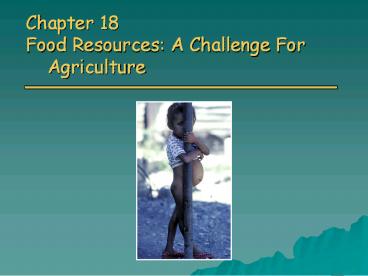Chapter 18 Food Resources: A Challenge For Agriculture - PowerPoint PPT Presentation
1 / 29
Title:
Chapter 18 Food Resources: A Challenge For Agriculture
Description:
Chapter 18 Food Resources: A Challenge For Agriculture Overview of Chapter 19 Food and Nutrition World Food Problems Principle Types of Agriculture Challenges of ... – PowerPoint PPT presentation
Number of Views:201
Avg rating:3.0/5.0
Title: Chapter 18 Food Resources: A Challenge For Agriculture
1
Chapter 18Food Resources A Challenge For
Agriculture
2
Overview of Chapter 19
- Food and Nutrition
- World Food Problems
- Principle Types of Agriculture
- Challenges of Producing More Crops and Livestock
- Environmental Impact of Agriculture
- Solutions to Agricultural Problems
- Fisheries of the World
3
Food and Nutrition
- Carbohydrates
- Sugars and starches metabolized by cellular
respiration to produce energy - Proteins
- Large, complex molecules composed of amino acids
that perform critical roles in body - Lipids
- Include fats and oils and are metabolized by
cellular respiration to produce energy - Vitamins and Minerals
4
Human Foods
5
World Food Problems
- Feeding growing population is difficult
- Annual grain production (left) has increased
since 1970 - Grain per person has not (right)
6
World Food Problems
- Famine
- Failure of crops caused by drought, flood or
catastrophic event - Temporary but severe shortage of food
- Maintaining World Grain Carryover Stockpiles
- Amounts of rice, wheat, corn and other grains
remaining from previous harvest - Provides measure of food security
- Decreased each year since 1987
- UN feels carryover stock should not fall below 70
days
7
World Grain Carryover Stock
- Why the decline?
- Rising temperatures
- Falling water tables and droughts
- Ethanol production
- More grain is going towards feeding livestock
8
World Food Problems
- Poverty and Food
- 1.3 billion people are so poor they cannot afford
proper nutrition - More common in
- Rural than urban areas
- Infants, children and the elderly
- Economics and Politics
- Cost money to store, produce, transport and
distribute food - Getting food to those who need it is political
9
Principle Types of Agriculture
- Industrialized agriculture
- Modern agriculture methods that require large
capital input, and less land and labor
10
Principle Types of Agriculture
- Subsistence Agriculture
- Traditional agricultural methods, which are
dependent on labor and large amounts of land - Examples
- Shifting cultivation
- Slash and burn agriculture
- Nomadic herding
- Intercropping
11
Challenges of Producing More Crop and Livestock
- Domestication and Genetic Diversity
- Domestication of crops and livestock causes a
loss of genetic diversity - Farmer selects and propagates animals with
desirable agricultural characteristics
- Many high yielding crops are genetically uniform
- High likelihood that bacteria, fungi, viruses,
etc. will attack and destroy entire crop
12
Challenges of Producing More Crop and Livestock
- Increasing Crop Yield
- Food production increased in developed countries
(wheat (left) - Pesticides
- Selective breeding
13
Case-In-Point Green Revolution
- High Yielding Rice Varieties
14
Challenges of Producing More Crop and Livestock
- Increasing Livestock Yields
- Hormone supplements
- US and Canada do this
- Europe does not citing human health concerns
- Antibiotics
- 40 of antibiotics produced in US are used in
livestock operations - Problems with increased bacteria resistance
15
Antibiotic Use and Resistance
16
Genetic Engineering
- Manipulation of genes by taking specific gene
from a cell of one species and placing it into
the cell of an unrelated species
17
Issue with Genetically Modified Organisms (GMOs)
- Determined to be safe for human consumption
- Concerns about GMO seed or pollen spreading in
wild - Backlash against GMOs
- GMOs are not currently labeled
- FDA finds it would be counterproductive and
expensive to label
18
Question of the day
- What are some examples of local sustainable
agriculture? - What is a CSA?
- Can fish be farmed? How?
19
Environmental Impacts of Agriculture
- High use of fossil fuels and pesticides
- Air pollution
- Untreated animal wastes and agricultural
chemicals - Water pollution
- Harms fisheries
- Insects, weeds, and disease-causing organisms
developing resistance to pesticides - Contaminate food supply
20
Environmental Impact of Agriculture
- Land degradation
- Decreases future ability of land to support crops
or livestock - Habitat fragmentation
- Breakup of large areas of habitat into small,
isolated patches - Cultivating marginal lands
- Irrigating dry land
- Cultivating land prone to erosion
21
Solutions to Agricultural Problems- Sustainable
Agriculture
22
Sustainable Agriculture
- Examples
- Natural Predator-prey relationships instead of
pesticides - Crop selection
- Crop rotation and conservation tillage
- Supplying nitrogen with legumes
- Organic agriculture
- Integrated Pest Management (IPM)
- Limited use of pesticides with sustainable
agriculture practices
23
Fisheries of the World- Problems
- No nation lays claim to open ocean
- Resource susceptible to overuse and degradation
- Overharvesting
- Many species are at point of severe depletion
- Cod (right)
- 62 of worlds fish stock are in need of
management action
24
Fisheries of the World- Problems
- Overharvesting (continued)
- Sophisticated fishing equipment
- Bycatch killed off
- Magnuson Fisheries Conservation Act
25
Fisheries of the World- Problems
- Ocean Pollution - dumping ground
- Oil
- Heavy metals
- Deliberate litter dumping
- Stormwater runoff from cities and agricultural
areas
26
Fisheries of the World- Problems
- Aquaculture
- Growing of aquatic organisms for human
consumption - Great potential to supply food
- Locations of fisheries may hurt natural habitats
ocean cage farming, ponds - Produce waste that pollutes adjacent water
27
Aquaculture (Fish farming)
28
http//www.lakesidefishfarm.com/environment.html
29
Taking Sides
- Can organic farming feed the world?
- You will be arguing from the point of view of the
article you read.































